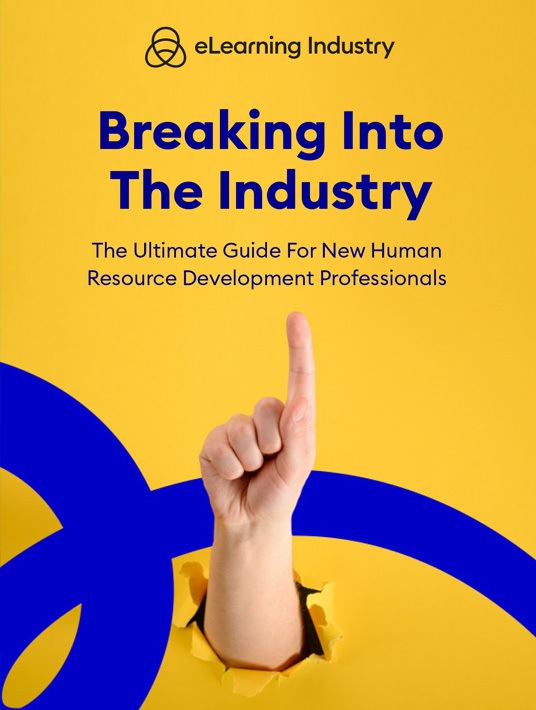The Ultimate Human Resource Development Professionals Guide
Human resource development professionals wear many hats. They help build a stronger team dynamic and boost employee morale. They also handle payroll, compensation, benefits, recruitment, and compliance. However, joining the HR department doesn’t have to be daunting. Not when you have this helpful guide on-hand that highlights all the fundamentals, from HR’s role in organizations to qualities every pro needs to cultivate. I’ll also review some of the key functions HR teams perform, essential concepts, and free resources at your disposal. All these can help you break into the industry and avoid the most common career pitfalls. Here's a sneak preview of what you'll find in this HR guide.
- What is Human Resource Management? 4 Human Resource Development Fundamentals
- The Importance Of HR Management And Human Resource Development Programs For Remote Workers
- 7 Crucial HR Functions Every Human Resource Professional Should Know About
- What Are The Top Qualities Of A Good HR Professional?
- 12 Essential HR Concepts To Master For New HR Professionals
- Which Resources Should Human Resources Managers Use To Hone Their Skills?
- How Do HR Professionals Use Online Marketing To Recruit New Hires?

1. What Is Human Resource Management? 4 Human Resource Development Fundamentals
Before we dive into the functions and skills every HR pro should know about, let’s cover the basics, such as the average salary and HR department’s role in the business infrastructure. These fundamentals can help you determine if HR is the best choice based on your skills, experience, and goals. Below are answers to some of the most commonly asked questions regarding human resource development careers.
What Is The Role Of HR In Organizations?
The primary role of HR teams in organizations is to recruit new talent and manage internal resources. They must also handle certain administrative duties such as strategic planning and data analysis. In short, HR professionals are responsible for the human resources or assets within the company. That includes maintaining compliance protocols, maintaining the knowledge base, and upholding employees’ rights. Of course, the role of HR varies based on the organization and its objectives, as well as all the individuals' job titles, core competencies, and respective tasks.
Who Is A Good Fit For Human Resource Development?
An HR employee is often defined as a "people person." They communicate effectively and represent the company’s interests, as well as those of individual staffers. HR managers must also be able to bring out their best in their team to hone their talents and delegate roles and responsibilities based on core strengths. For example, recruit new employees that possess niche know-how or skills based on the current pain points of the business. People who are well organized, adept planners, and passionate about helping others are ideal for HR.
How Does HR Interact With Other Departments?
HR interacts with every department within the organization in some form. For instance, they must recruit and interview new employees for the customer call center or sales team. They’re also in charge of maintaining compliance. Particularly when it comes to benefits, employee rights, and safety. As an example, they ensure that everyone feels secure in the workplace by enforcing anti-harassment protocols. HR teams work closely with department leaders, as well, to identify gaps and reevaluate goals, such as creating hiring profiles and securing talent for the customer service team.
How Much Do A Human Resource Manager Make?
The HR salary greatly depends on location, industry, and job requirements. According to the U.S. Bureau of Labor Statistics, the average pay rate for HR professionals as of May 2018 was $113,300. However, those in the healthcare and social assistance sectors made roughly $97,620. Tech service HR professionals on the other hand earned about $127,690. Other factors that come into play include past experience, skillsets, and which tasks fall under your professional purview.
2. The Importance Of HR Management Programs For Remote Workers
The relationship between HR and business strategy is based on several factors. HR pros must know about human resources recruitment processes and strategies and talent management. This ensures that current employees stay onboard while you expand your workforce to fill existing gaps. Many organizations now follow the remote working rule due to the COVID crisis. However, many of them had telecommuting teams long before the global pandemic since it’s often more cost-effective and allows for greater flexibility. Thus, the importance of HR management is even more relevant now due to the fact that employees need ongoing support and organizations must expand their talent pool from afar. Here are 6 reasons why HR teams are so essential for remote workers.
Ensure Employees’ Rights
Every team leader should ensure that their subordinates have a safe and secure work environment. However, HR employees are generally the ones to roll out new policies and protocols. They also verify that all the company standards are met and that staffers have all the support they require. For instance, they might host a webinar to introduce new anti-discrimination policies. Then ensure that all managers are aware of how the regulations pertain to their teams.
Build A Stronger Team Dynamic
The HR department helps businesses strengthen their team dynamics and create a supportive workplace. In the case of remote working, human resource development professionals might onboard new staffers virtually. Or schedule performance evaluation meetings with staffers to point out areas of improvement. For example, certain employees may need to work on their communication skills to be more effective team players.
Recruit Top Performers To Fill Gaps
HR managers are usually responsible for identifying gaps within the organization in terms of human resources. Then they have to figure out how to bridge them cost-effectively by hiring the right team members. This involves a variety of recruiting techniques, which we’ll cover later. But they must also conduct interviews and assessments to choose the best candidate for the position. This calls for an internal needs analysis, as well. For instance, which departments are underperforming and why? Which qualities must new employees possess to build a stronger team and achieve business objectives?
Give New Hires A Solid Start
New employees join the organization with a basic understanding of their roles and duties. But the HR leaders help them fill personal gaps and maximize their potential. For example, provide them with effective onboarding training so that they know how to perform tasks as well as utilize their skills and competencies to contribute to the team and uphold company standards. The L&D department is usually responsible for content development and training initiatives. However, the HR department ensures that new staffers have all the necessary support and make the most of the training assets.
Develop Internal Talent
It’s not only new hires that need to address personal pain points and build crucial skills. HR employees also develop internal talent. For instance, they identify top performers who may be ready for management. Or they use performance evaluation data to customize an employee development plan. They can also determine if a staffer's skills are better suited elsewhere such as in other departments or job roles.
Reduce Compliance Risks
Another reason why HR development is so important in the modern workforce is that it mitigates risks. Human resource professionals may not set the compliance guidelines. But they do need to ensure that employees follow the rules and understand company expectations. As a result, your organization doesn’t incur costly fines and penalties and staffers stay safe on the job. Not to mention, it keeps its brand image and reputation intact.
3. 7 Crucial Functions Every Human Resource Professional Should Know About
HR functions vary based on the specialization area and human resources organizational structure. However, there are a few HR functions and tasks that are generally the same across the board, regardless of your industry or staff size. Here are 7 core HR functions that every HR professional should be aware of, even if they don't fall into your current job description.
Employee Recruitment
How do you find the right person for the job? Which qualifications should you consider in the first place? The HR team is responsible for new hire recruiting. You need to know where to look and what to look for. In short, how do you attract qualified job candidates that fill a hole in your organization and make meaningful contributions? This involves a variety of tasks from creating job postings to conducting virtual interviews. You must also be able to creatively recruit top talent using available resources. For example, you can launch online courses to draw in skilled professionals and evaluate the data to find hidden gems.
Human Resource Allocation
You need to maximize resources to improve ROI and reduce spending. Who belongs in which department? Which employees are best suited for certain job roles? In short, you need to play the HR matching game to help every team optimize their efficiency. This doesn’t just pertain to new hires, either. You must also reevaluate employee skills and experience levels from time to time. Then determine if their tasks align with their talents. Or if you need to rethink their job description to prevent overlapping and balance out the workload.
Performance Management And Evaluation
The human resources department typically handles performance evaluations. For example, team leaders provide feedback for their staffers and assess their strengths and weaknesses. Then HR analyzes the results to look for trends and streamline the business strategy moving forward. In some cases, they also intervene to offer employees personalized support, such as recommending relevant training resources or setting up development contracts.
Staffer Relations
One of the most essential functions of human resource management is to improve internal collaboration. Staffers need to get along with each other and respect differences. Just as managers need to communicate with their team and provide constructive feedback. Simply put, HR must maintain positive staffer relations so that everyone can do their job effectively without having to worry about coworker conflicts or bullies hindering their work performance.
New Hire Development
HR training and development initiatives bring new staffers up to speed and prep them for upcoming challenges. This involves personalized onboarding that goes beyond traditional new hire orientation. For example, identify pre-existing performance gaps and create an individual growth plan. Or host a weekly workshop for new hires to address their concerns and provide timely support.
Career Planning
Career stagnation is one of the most common causes of high employee turnover. Staffers need to continually develop their talents and evaluate performance behaviors. Human resource development team members work with employees to plan their career trajectory and make targeted recommendations. For instance, what do they need to work on before applying for leadership positions? Which job roles will help them achieve their long-term goals and fulfill their personal needs?
Compliance Enforcement
What do HR managers do to reduce risks and maintain a safe work environment? For remote workers, telecommuting removes many compliance hazards. However, ergonomics, data safety, and anti-harassment are still relevant. There may not be a dress code, but HR staffers must uphold other compliance regulations. For instance, share anti-harassment policy updates with staffers and serve as the point of contact for incident reports.

4. What Are The Top Qualities Of A Good HR Employee?
What qualities make a good human resource manager? Ultimately, HR employees must balance compassion with a commitment to excellence. They need to enforce certain rules but also understand employees’ needs and challenges. This requires a specific skillset that ranges from creative problem-solving to conflict management. Every HR professional should cultivate these 9 competencies to forge a successful human resource development career.
Empathetic
Empathy is one of the essential building blocks for how to become a good human resource manager. Empathetic skills allow you to connect with staffers and understand their specific needs. As a result, you’re able to bring out the best in them and retain top performers. Effective HR leaders help create a more positive work environment and corporate culture, in many respects. For example, you may have to meet with employees one-on-one to discuss their performance and point out areas for improvement. A little tact and empathy go a long way to enact meaningful change within the organization.
Effective Communicator
HR professionals must be able to effectively convey company expectations, policies, and protocols. One of the best tips for how to increase communication skills is to build real-world experience. Work on active listening and non-verbal communication during everyday conversations. There are also online courses and workshops that focus on communication skills in the workplace.
Well-Organized
HR managers are adept at organization and planning. They have to manage remote work teams and find gaps in the talent pool. For example, human resource development employees analyze business reports and LMS metrics before recruiting. This allows them to create a hiring profile to choose the best candidates who possess niche skills. You also need to maintain accurate records and stay on top of HR compliance regulations. HR pros are masters at having "all their ducks in a row."
Decision-Maker
HR pros are responsible for making some of the most crucial decisions within the organization, from choosing the right applicant to analyzing job redundancies. The ideal approach for how to improve decision-making skills is to evaluate your choices, historically speaking. What have been the best—or worst—decisions you’ve made, and what was the basis for them? What is your typical decision-making process? Do you take calculated risks and weigh all possible outcomes?
Problem-Solver
Human resource development professionals solve problems every day. Whether it’s finding a replacement for an employee who just left or trying to stretch the payroll budget. Thus, HR managers need to possess strong problem-solving skills. This also involves a fair amount of creativity and analytical skills. Since they’re often called on to use their lateral thinking abilities to troubleshoot employment issues. For instance, how are you going to implement a new hiring policy without overhauling the entire recruitment process?
Fiscal-Minded
HR professionals may not be on the accounting team, but they still need to hone their budgeting skills and financial forecasting expertise. For instance, you only have so much room in the budget to onboard a new employee. How do you allocate resources effectively to minimize spending and ensure they’re off to a great start? What percentage of your budget goes to talent development versus benefits and employee wellness planning?
Maximizing In-House Talent
This is a two-parter. First and foremost, HR professionals need to cultivate internal talent and encourage everyone to be at the top of their game, whether they’re working behind the scenes in the warehouse or providing top-notch service in the call center. The second factor is knowing where employees’ talents lie so that you know where to place them. As well as how to hone relevant skills that tie into their work duties.
Possessing Strong Leadership Skills
Even HR employees who aren’t managers should build their leadership skills. The HR department is often seen as the driving force behind organizations. This is due to the fact that they bring in new talent, manage human assets, and set the compliance example. As such, HR staffers need to take the lead and help every department boost performance. Not to mention, support line managers and supervisors so that they have all the tools they need.
Conflict Management Pro
I’m not suggesting that HR employees should be the main in-house mediators. However, they may have to step in to resolve internal conflicts and maintain a positive workspace. Even if employees work remotely. For example, there’s an issue between two remote sales employees regarding commissions. The HR manager might meet with them to discuss the problem and possible solutions as well as help them build their respective communication skills to prevent future disagreements.
5. 12 Essential HR Concepts To Master For New Human Resource Leaders
The HR industry has a whole new glossary you need to master to fulfill your role. This is in addition to industry-related terms you must know to hire the right people and manage internal talent. Before you start applying for positions, add these 12 terms to your personal dictionary. You should also take it a step further and analyze these HR concepts individually based on your job position. For instance, which HR analytics does your organization use and how will you evaluate them? Our HR eBook has all this info so that you can refresh your memory and master these industry terms.
Employee Turnover
Turnover refers to the number of employees you lose during a specific time period. High turnover rates usually indicate a problem with the business strategy or employee development program. HR employees must know how to calculate employee turnover rates and identify root causes. For example, why have you lost 5% of your workforce this quarter? Are there cost-effective ways to retain top performers and reduce new hire recruitment expenses?
HR Analytics
This is the process of gathering data within the organization to optimize employee performance and resource allocation. This information is used in various departments to make crucial decisions and disclose hidden gaps. For instance, one department has a higher employee turnover rate than others. Why is this the case and how can you improve work practices or L&D initiatives to lower those stats?
Data-Driven Approach
This goes hand-in-hand with human resource development analytics as the data-driven approach is all about taking action based on the metrics. HR pros use the data to set goals and measurable outcomes. For instance, they interpret reports to make strategic hiring decisions. Instead of merely making assumptions, everything is based on facts and figures. This also makes it easier to evaluate success and measure performance thanks to quantitative data.
Performance Feedback
Feedback is a crucial part of every organization because it allows employees to grow and develop their skills. Performance feedback, in particular, focuses on habits and behaviors. This often comes in the form of appraisals or evaluations provided by managers. Then the HR team analyzes the findings to draw conclusions and identify trends. They can also formulate individualized improvement plans to maximize human resources.
Employee Experience
While many businesses already evaluate CX (Customer Experience) scores, employee experience stats are also essential. This sums up the holistic experience your staffers have during their tenure, from their relationships with coworkers and managers to L&D opportunities. It’s important to provide a positive employee experience to not only retain top talent but recruit new staffers as well. Job candidates are more likely to apply for positions if current/past employees have enjoyed their time with the company.
360-Degree Survey
The 360-degree survey takes performance feedback to the next level. In short, it compiles information from a variety of sources to evaluate staffers. For example, peer surveys, business reports, and team leader interviews all come into play. This forms a more complete picture of the staffers’ proficiency and work habits. The employee is also encouraged to rate their own performance and set personal goals.
Applicant Tracking System
Also known as ATS, applicant tracking systems are used for recruiting and hiring new staffers. They allow you to keep all the data organized and centralized so that you can evaluate candidates, update their status, and determine who moves on to the next round of hiring. This software is also ideal for storing resumes so that you can create a database to draw on for future job openings.
Strategic Human Resource Management
SHRM focuses on current and long-term business objectives. HR managers must determine how employees meet organizational goals and expectations. And whether the current talent pool has the necessary skills and expertise to achieve long-term business success. If not, you must develop a new strategy to onboard additional staffers and/or transform the organizational culture.
Job Demands-Resources Model
This model centers on employee workload. In essence, strain and stress are caused when a staffer’s work responsibilities are disproportionate to available resources. For example, they may not have enough time or the right tools to complete their work tasks. In this case, the HR department must determine what they’re lacking and how to provide them with the necessary support. This may involve additional training, upgrading work software, or evenly distribute the workload.
CRM System
CRM (Customer Relationship Management) software isn’t just for improving customer relations. It also allows you to automate and/or streamline a variety of HR-related tasks, from employee recruitment to payroll management. As an example, you can maintain employee records to simplify performance management. Or get feedback from all relevant stakeholders when making your hiring decision.
Succession Planning
One of the hottest human resources buzzwords is succession planning. It basically means preparing emerging leaders for their new roles and developing in-house talent. This involves determining which roles need to be filled and which qualifications are required. Then you can figure out which staffers are ideally suited for these positions and equip them with the knowledge they need.
Compensation And Benefits
This is an umbrella term that covers everything from pay rate and salary to health benefits. HR team members must ensure their organization has a healthy benefits package to attract qualified candidates and retain experienced employees. Online training and development is also part of an effective compensation plan since staffers are always looking for new opportunities to broaden their horizons.

6. Which Resources Should Human Resources Managers Use To Hone Their Skills?
HR employees have a wide range of resources to help them develop their skills and expand their knowledge base. While some require a small investment, others are available for free online. As is the case with all career paths, homework is involved. Courses, eBooks, and blogs give you the opportunity to explore different facets of the HR profession. They also help you choose a specialization area that aligns with your strengths and talents.
HR Guides And eBooks
What are the skills required for HR? How do you land your first HR position? What are the different learning resources at your disposal? One of the most effective tools to develop HR skills and expertise is online guides. eBooks give you an insider’s perspective so that you know what to expect and how to hone your talents. Best of all, they’re usually free or low-cost. This means that you can jumpstart your HR career without spending a small fortune on personal L&D.
LinkedIn Groups
Another great place to look for skill development and learn about employee development methods is LinkedIn. There are groups dedicated to helping HR pros, experienced or otherwise, and broadening their knowledge base, such as mastering the basics of human resources management software and time tracking systems. They also help them develop resilience skills and uncover the fundamentals of managing payroll and insurance plans. You can check out other social media sites for exclusive HR groups as well as an HR online community that features human resource development trends and resource links, too.
Online Events
There are plenty of online events that focus on HR skill-building, like webinars and workshops. There are hot topics that every new HR professional should know about. For example, HR experts discuss the mindset of improvement or insider tips to retain employees. While other events might cover crisis management and self-assessment and improvement. Some hosts require you to RSVP in advance. But there are others who post pre-recorded sessions you can watch whenever your schedule allows.
Human Resource Blogs
HR blogs are packed with helpful articles and tip sheets that usually cover a broad spectrum of topics ranging from core competencies to human resource troubleshooting. That said, it’s crucial to find a reliable source of information. Preferably, one that’s hosted by an industry thought leader or L&D insiders with background experience. You can also follow their social media pages to stay up-to-date and ask questions directly.
HR Productivity Apps
Why not test the waters and sign up for free HR software trials or demos. Exploring human resources and personnel management systems on your own can help you build crucial tech skills. But you also get a feel for HR functions and work processes. Time tracking tools, CRM software, and personal tracking systems are also worth researching.
eLearning Courses
Sign up for relevant human resource development skill-building courses to target personal gaps. As an example, courses that focus on communication and active listening. Or time management if you have trouble sticking to your schedule. Now is the time to identify areas for improvement that tie into your new profession. Then use eLearning courses to hone these core competencies and add related skills to your resume.
7. How Do HR Teams Use Online Marketing To Recruit New Hires?
Staff recruitment is one of the key roles for HR professionals. But how do you attract qualified candidates without going over the department’s budget? The first step is to identify your needs to target the right hiring audience. Then you should compile a list of go-to recruiting tools that you can use for each round of recruitment. Below are a few ways to use online marketing to your advantage to recruit new hires to fill those vacancies.
Post On Job Listing Websites
Job posts help you attract top talent cost-effectively. The trick is to go with niche sites that cater to your industry and have a broad reader base. For instance, thousands of people visit the site every month. Thus, you’re more likely to draw in top recruits who have the necessary expertise and experience. In fact, you can create a job listing on eLearning Industry. It even features engagement metrics to help you evaluate stats and maximize your listing’s exposure.
Create Guest Posts
This is a creative approach to employee recruitment. You can establish yourself as an industry authority and share your HR insider tips. You can also start building a rapport with readers, some of who might be potential job applicants. Another perk is being able to send the link to potential recruits. This way, they get a feel for your HR department’s approach and brand image as a whole. Plus, the article may have some tips and tricks to help them fine-tune their resume or build relevant skills.
Make The Most Of Social Media
Finding new hires through LinkedIn Recruiter or Facebook hiring groups is another great way to onboard new talent. Once again, you should zero in on the type of candidates you need to attract based on your objectives and current pain points. This will not only help you choose the best marketing platform but also craft the perfect job listing. For example, these are the essential skills and background experience they must possess. As well as the steps they need to take to apply for the position and submit their resumes.
Bonus Tip: Review Job Boards
This is a less proactive approach but it’s still worth adding to the list. The right person for the job may have already posted their resume on job boards or employment sites. Thus, you can peruse through profiles that match your criteria and invite them to apply. Or even direct them to your job listing on other sites where they can find more info.
Conclusion
Employees are every organization’s most valuable asset, regardless of your niche, customer base, or budget. An HR professional knows how to make the most of human resources and help their organizations achieve long-term success. To accomplish this, HR professionals must possess niche know-how and specific skillsets. They need to align their strategies with organizational goals and outcomes as well as master all the HR concepts and apply them to recruit, onboard, and manage in-house talent. However, it also happens to be a rewarding career that allows you to bring out the best in staffers and optimize business potential. Are you an HR expert (or aspiring human resource development pro) who wants to share their expertise? Do you have any HR-related stories that might help others improve work practices or hone their talents? Why not guest post on eLearning Industry to build authority and offer your unique insights?
Our eBook has all the HR insider tips and tricks you need to land your dream job. We show you how to kick-start your career in human resource development and broaden your skillset. Download Breaking Into The Industry: The Ultimate Guide For New Human Resource Development Professionals today.
Resources:
Human Resources Managers-Occupational Outlook Handbook






